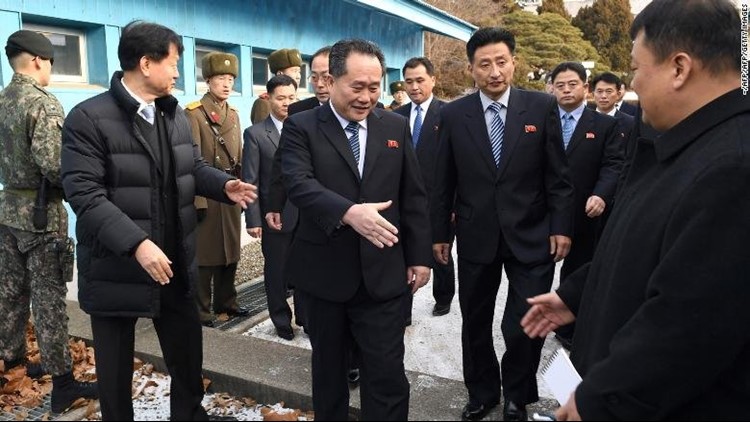SEOUL, S. Korea — North Korea has agreed to send a delegation to next month’s Winter Olympics in South Korea and to hold talks with Seoul to ease military tensions, in the most significant thaw in relations between the neighboring states in years.
Officials from the two nations met face to face on Tuesday for the first time in more than two years in the border town of Panmunjom, known as “truce village,” in the Korean peninsula’s heavily fortified demilitarized zone.
North Korea will send a high-level delegation comprising athletes, a cheering squad, an art troupe, a visitors’ group, a Taekwondo demonstration team and a press corps, a closing joint statement said.
The two countries also announced military talks “to ease the current military tensions” following a year of hostilities over North Korea’s missile and nuclear testing in the region and US-South Korea joint military drills over the peninsula.
“South and North Korea have decided to make joint efforts for the unity of the people and reconciliation by establishing an environment for peace and easing military tensions on the Korean Peninsula,” the statement read.
The talks make official the sentiments from North Korean leader Kim Jong Un, who in a New Year’s Day address said he wanted his country to compete in the Olympics. His statement was seen as an olive branch after a year of aggression, as Kim oversaw significant advancements in Pyongyang’s nuclear and long-range missile technologies.
But it was not all harmony on Tuesday. North Korea’s chief negotiator, Ri Son Gwon, expressed strong discontent over South Korean claims to the media that denuclearization was discussed on Tuesday and could be part of military talks. He at the same time issued a threat to the US.
“Speaking of the nuclear issue, all state-of art-strategic weapons, including atomic and hydrogen bombs, ICBMs, rockets, are entirely targeting the US. It is not targeting our own people. It is not targeting China and Russia as well,” Ri said. ICBMs refer to intercontinental ballistic missiles.
South Korean Unification Vice Minister Chun Hae-sung also said earlier there was a need to promptly resume dialogue on a peace settlement, which should include denuclearization.
Ri also criticized Chun for announcing plans to re-open a military hotline between the countries. He claimed that decision had been made on Wednesday last week and were not a result of Tuesday’s talks.
The hotline was one of many shut down as inter-Korean relations soured.
Family reunifications floated
Tuesday’s meeting at Peace House in the Joint Security Area, also known as Panmunjom, began awkwardly with small talk about the weather — a sign that any restoration of relations was not going to be quick.
“Entire rivers and mountains are frozen,” Ri, the North Korean negotiator, told reporters. “It wouldn’t be an exaggeration to say that compared to nature’s weather, the inter-Korean relationship is even more frozen.”
The five-member North Korean delegation, dressed in fitted dark suits and polished dress shoes, arrived at the border via motorcade shortly before 9:30 a.m. Seoul time, and then made the short walk across the military demarcation line into the South Korean side of Panmunjom.
South Korean negotiators floated organizing another round of reunifications for families separated during the Korean War — which is technically still ongoing, as no formal peace treaty has been signed.
Both North Korea’s Kim and South Korean President Moon Jae-in were able to listen to the discussions in real time, and each had a hotline at their disposal direct to the Peace House.
John Delury, a professor at Yonsei University’s Graduate School of International Relations in Seoul, said military talks and reunifications were presented to the North Koreans last year, but no headway was made.
“South Korea has been working at this for a long time,” he said. “Seoul already proposed those things: Let’s get our militaries talking and let’s reunite families. Technically, North Korea really never said no.”
China, Russia and Japan all welcomed the talks in public statements. The three countries were part of the now-defunct, six-party talks in the 2000s, a failed diplomatic effort to end North Korea’s nuclear program.
Let the Games begin
The International Olympic Committee (IOC) welcomed the agreements between North and South Korea on Tuesday, and said it would discuss the details before making an official decision on the country’s participation.
“These proposals mark a great step forward in the Olympic spirit,” IOC President Thomas Bach said.
The IOC is waiting for official reports from the meeting and will then discuss issues such as the number and names of athletes who might be eligible to take part. The IOC has been very open to the idea, having extended a deadline to participate for the Games after North Korea indicated it wanted to join.
To date, the only North Koreans to qualify for the Pyeongchang Games are the figure skating pair of Ryom Tae Ok and Kim Ju Sik. However, the North Korean National Olympic Committee did not meet an October 30 deadline to accept their spot.
Speaking to CNN, Duyeon Kim, a visiting fellow at the Korean Peninsula Future Forum, warned that Pyongyang might try to extract as many concessions as possible in return for its participation at the Olympics.
“Under the table or upfront. In the past the South has had to pay a certain amount, there has always been a price tag for the North’s participation,” she said.
Despite climate and terrain favorable for participating in cold-weather sports, North Korea hasn’t sent a delegation the Winter Olympics since 1992 (the Winter and Summer Games were hosted in the same year until 1994).
Pyongyang boycotted the 1988 summer Games in Seoul after efforts to jointly host the event with the South collapsed. North Korea, along with a handful of other allies of the USSR, also boycotted the 1984 Los Angeles Olympics in response to the US boycott of the 1980 Olympics.
Since the 1988 Games, North Korea has participated in every Summer Olympics. They took home seven medals during the Rio Games in 2016.



